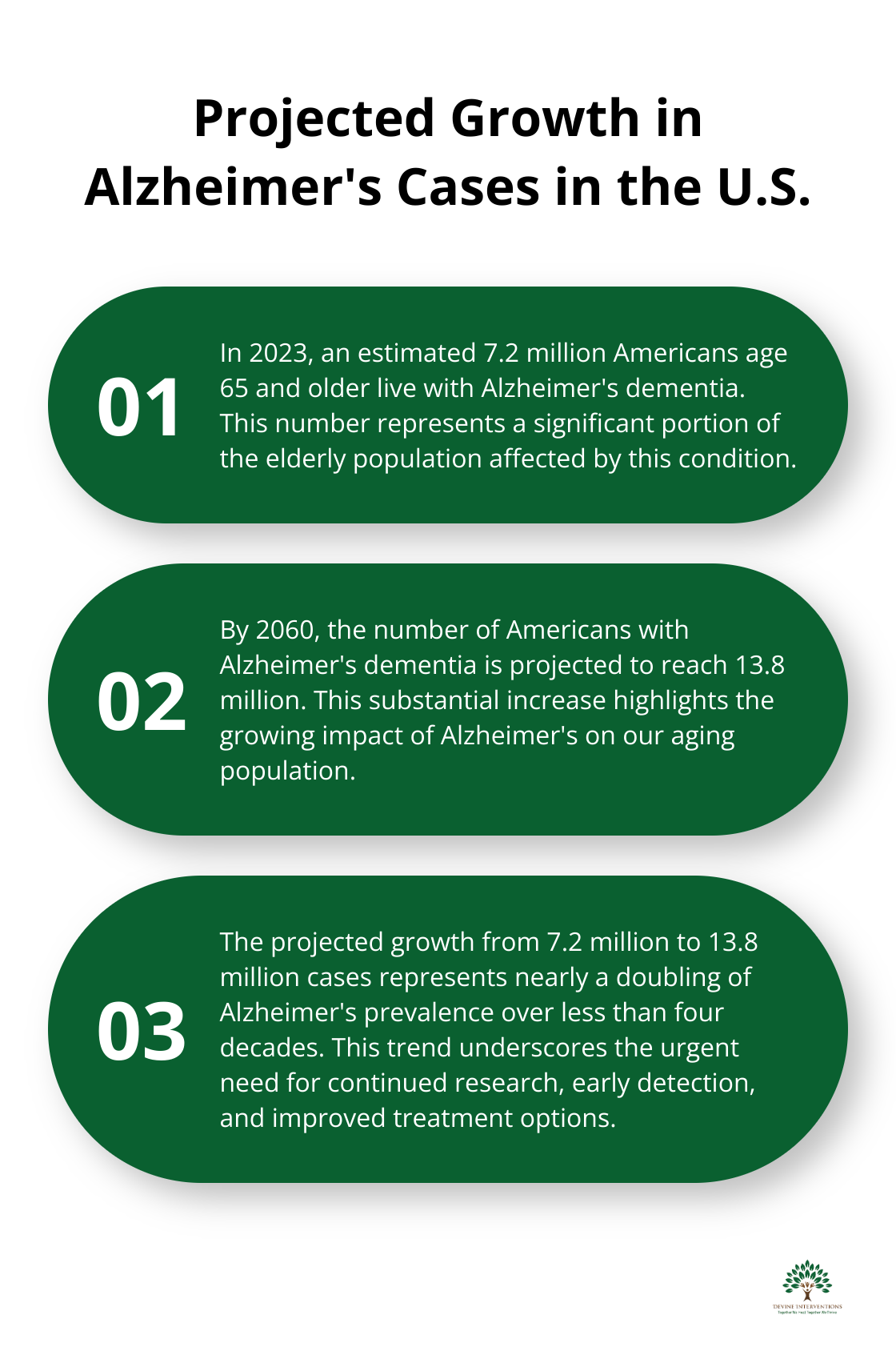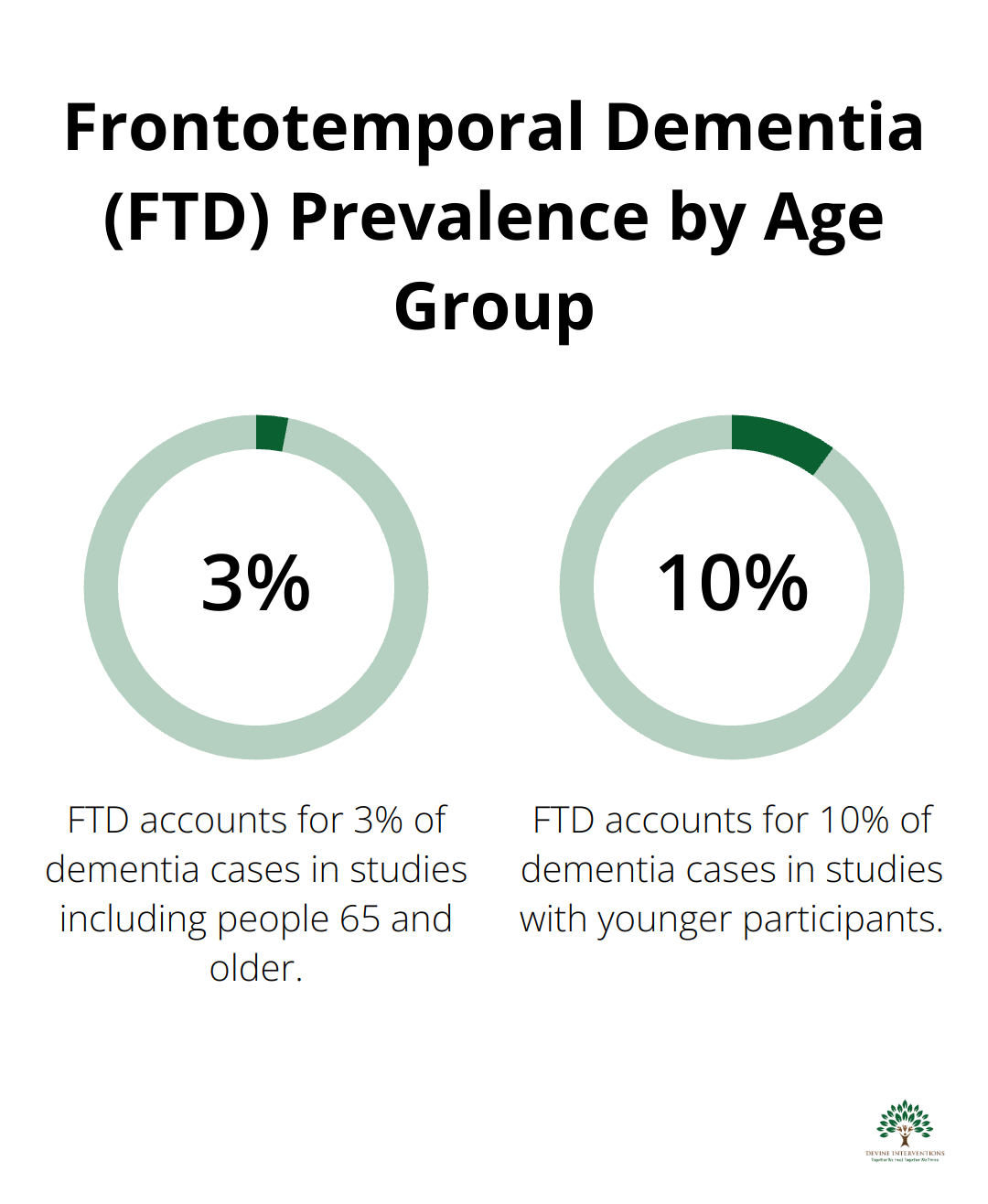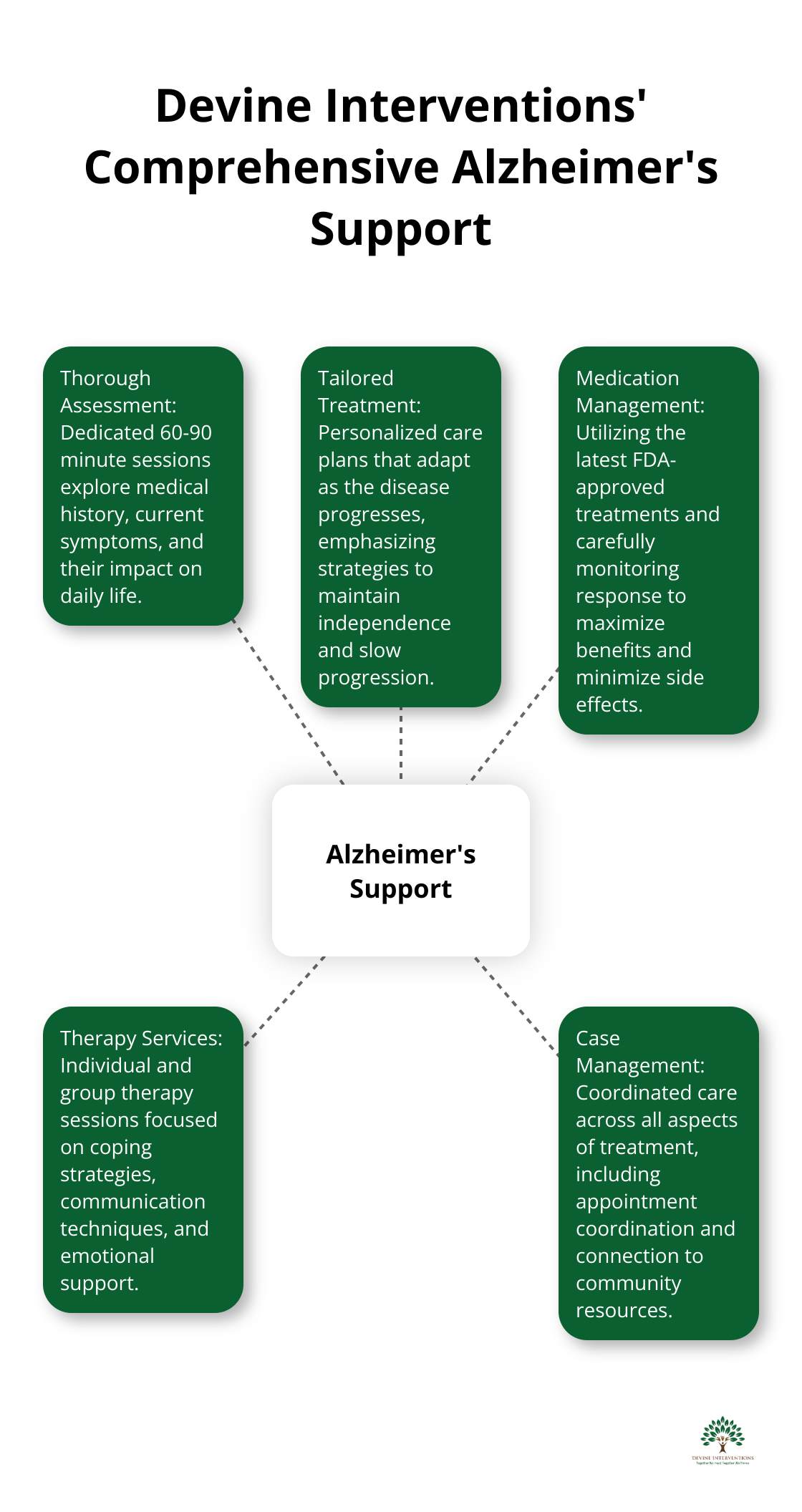Alzheimer’s disease can be a challenging journey for patients and their families. Early detection plays a vital role in managing the condition effectively.
At Devine Interventions, we understand the importance of recognizing the signs and providing comprehensive support. This guide will help you understand the key indicators of Alzheimer’s and how we can assist you or your loved ones in Hyattsville.
What Are the Early Signs of Alzheimer’s?
Changes in Memory and Daily Life
Alzheimer’s often starts with memory issues that disrupt daily life. At Devine Interventions, we observe how early detection leads to better outcomes. People with Alzheimer’s might ask the same questions repeatedly or forget important dates. This isn’t occasional forgetfulness – it’s persistent and disruptive.
A patient once shared how her father, previously meticulous about bill payments, suddenly started missing due dates and accumulating late fees. This change in managing daily tasks can signal a red flag.
Struggles with Planning and Problem-Solving
Early-stage Alzheimer’s can make planning or problem-solving challenging. You might notice a family member having trouble following a familiar recipe or managing monthly bills.
An estimated 7.2 million Americans age 65 and older live with Alzheimer’s dementia today. This number could grow to 13.8 million by 2060. This highlights the need for awareness and early intervention.

Difficulty with Familiar Tasks
Watch for struggles with routine activities. This could include forgetting the rules of a favorite game or getting lost while driving to a familiar location.
We’ve worked with clients who suddenly found it challenging to use household appliances they’ve operated for years. These seemingly small changes can indicate significant cognitive decline.
Time and Place Confusion
Alzheimer’s can disrupt a person’s sense of time and place. They might lose track of dates, seasons, or the passage of time. Some individuals may forget where they are or how they got there.
A client’s daughter once told us how her mother got confused about whether it was morning or evening, leading to disrupted sleep patterns. This type of disorientation often requires professional assessment.
Visual Perception Issues
Problems with vision can also indicate early Alzheimer’s. This isn’t about typical age-related vision changes. Instead, it’s difficulty judging distances, determining color contrasts, or recognizing objects in relation to each other.
For instance, a person might have trouble distinguishing the edge of a step (leading to falls) or struggle to read because the words seem to jump around on the page.
If you notice any of these signs in yourself or a loved one, seek professional help. Early diagnosis can open doors to treatments and support services that can significantly improve quality of life.
Now that we’ve explored the early signs of Alzheimer’s, let’s examine how these symptoms differ from normal aging. Understanding this distinction is key to recognizing when it’s time to seek professional help.
Is It Alzheimer’s or Just Aging?
Spotting the difference between normal aging and Alzheimer’s challenges many families. At Devine Interventions, we often hear from worried relatives unsure if their loved one’s forgetfulness warrants concern. Let’s examine key differences to help you recognize when professional help becomes necessary.
Memory Loss That Disrupts Daily Life
Everyone forgets things occasionally. Alzheimer’s-related memory loss, however, extends beyond misplacing keys. Patients sometimes forget how to return home from familiar locations. This level of memory loss significantly impacts daily functioning and independence.

A systematic review found that frontotemporal dementia (FTD) accounted for about 3% of dementia cases in studies that included people 65 and older and about 10% of dementia cases in studies with younger participants.
Difficulty With Familiar Tasks
Normal aging might cause you to occasionally forget to record a favorite TV show. Alzheimer’s, however, can make routine tasks bewildering. Clients sometimes suddenly can’t remember how to make their morning coffee or use the microwave they’ve operated for decades.
Mood and Behavior Changes
Mild mood swings occur commonly as we age. Alzheimer’s, however, can cause severe and unpredictable changes. Family members often report loved ones becoming uncharacteristically angry or withdrawn. These changes can strain relationships and lead to social isolation.
Problems with Visual Perception
Normal aging might cause some vision changes (e.g., needing reading glasses). Alzheimer’s, however, can affect how the brain processes visual information. This might manifest as:
- Difficulty judging distances (leading to falls)
- Problems distinguishing colors or contrast
- Challenges recognizing objects in relation to each other
Language and Communication Issues
Occasional word-finding difficulties happen to everyone. But Alzheimer’s can cause more severe language problems, such as:
- Frequently forgetting simple words
- Substituting unusual words, making sentences hard to understand
- Stopping mid-conversation, unable to continue
If you notice these signs in yourself or a loved one, don’t wait to seek help. Early intervention can make a significant difference in managing Alzheimer’s and maintaining quality of life. Professional assessment (like those offered at Devine Interventions) can provide clarity and open doors to treatment options that slow progression and improve daily functioning.
Recent data shows that consumption of Alzheimer’s-specific independent medical education (IME) increased by 18% among clinicians involved in the Alzheimer’s journey post-approval of new treatments. This increased education among healthcare providers is crucial for improving early detection and treatment of Alzheimer’s disease.
How We Support Your Alzheimer’s Journey
At Devine Interventions, we offer a comprehensive support system tailored to each individual’s needs. Our approach extends beyond basic care to address the complexities of Alzheimer’s disease.
Thorough Assessment and Personalized Care
Our first step involves a detailed assessment. We dedicate 60-90 minutes to explore your medical history, current symptoms, and their impact on your daily life. This thorough approach allows us to create a personalized treatment plan that addresses your specific challenges.
Our team utilizes the latest diagnostic tools and techniques. We assess memory, problem-solving skills, visual perception, and language abilities. This comprehensive view helps us detect Alzheimer’s early (when treatment is most effective).
Tailored Treatment at Every Stage
Alzheimer’s progresses over time, and your needs will change. We don’t offer one-size-fits-all solutions. Instead, we adjust your care plan as the disease evolves.
In early stages, we emphasize strategies to maintain independence and slow progression. This may include memory exercises, lifestyle changes, and medication to manage symptoms. As the disease advances, we shift towards more intensive support, helping families navigate care decisions and daily challenges.
Our treatment plans always involve you and your family. We believe in collaborative decision-making, ensuring you feel comfortable and confident with every step of your care.
Medication Management and Cutting-Edge Treatments
Medication plays a key role in managing Alzheimer’s symptoms and slowing disease progression. Our psychiatric providers stay current with the latest FDA-approved treatments. We monitor your response to medications carefully, making adjustments to maximize benefits and minimize side effects.
Recent advances in Alzheimer’s treatment show promise. New medications targeting amyloid plaques in the brain have entered the market. For instance, Kisunla (donanemab) is the first and only amyloid plaque-targeting therapy that uses a limited-duration treatment regimen based on amyloid plaque removal. While not a cure, these treatments can potentially slow cognitive decline. We’ll discuss if these options might suit you, always weighing potential benefits against risks.
Medication forms just one part of a comprehensive treatment plan. We combine pharmacological approaches with therapy, lifestyle interventions, and support services for optimal outcomes.

Therapy Services for Patients and Families
We offer individual and group therapy sessions tailored to Alzheimer’s patients and their families. These sessions focus on:
- Coping strategies for memory loss
- Communication techniques
- Stress management for caregivers
- Emotional support throughout the disease progression
Our therapists specialize in working with Alzheimer’s patients, understanding the unique challenges this disease presents.
Case Management for Coordinated Care
Our case management services ensure coordinated care across all aspects of Alzheimer’s treatment. A dedicated case manager will:
- Coordinate appointments with various specialists
- Help navigate insurance and financial concerns
- Connect you with community resources (support groups, home care services, etc.)
- Assist with long-term care planning
This comprehensive approach ensures no aspect of your care falls through the cracks.
Final Thoughts
Alzheimer’s disease challenges patients and families, but early detection and comprehensive care improve outcomes. At Devine Interventions, we understand the complexities of Alzheimer’s and offer tailored support for patients and families in Hyattsville. Our approach addresses the multifaceted nature of Alzheimer’s, adapting our services to meet changing needs.
We combine clinical excellence with genuine compassion to foster an environment where healing and dignity take priority. If you or a loved one experience memory changes or other concerning symptoms, don’t wait to reach out. Early intervention can make a significant difference in managing Alzheimer’s and maintaining quality of life.
At Devine Interventions, we commit to supporting you through every stage of Alzheimer’s. We offer hope and practical solutions for living well with this condition. Take the first step towards comprehensive care and support today (your journey to better management of Alzheimer’s starts here).







